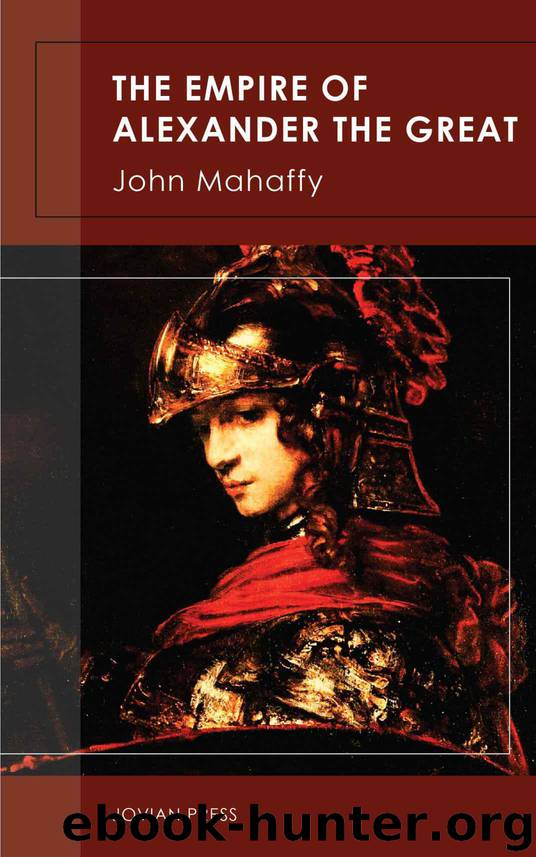The Empire of Alexander the Great by John Mahaffy

Author:John Mahaffy [Mahaffy, John]
Language: eng
Format: epub
Publisher: Jovian Press
Published: 2016-11-21T23:00:00+00:00
KING AGIS OF SPARTA - THE POLITICAL THEORISTS OF THE DAY
..................
WE HAVE NOTICED THAT ARATUS was not a philosopher or a theorist, but a practical man, often a mere diplomatist, carrying out a peculiar policy perhaps from ambition, perhaps from a higher principle, but as we shall see, never without jealousy and selfishness. He lived in an age when practical philosophy had taken deep hold of the nobler minds and such men were eager to carry their theories into life. Some philosophers like those at Sicyon who were friends of Abantidas, and enticed him to a discussion in their garden where he was murdered, were determined opponents of monarchy, and still held by the old Greek instinct of Republican liberty. So strong was this feeling in Epirus, that when the daughter of Pyrrhus, Queen Deidamia, lost her two sons, the heirs to the throne of Pyrrhus, th people insisted on abolishing the royalty (about 234 B.C.) though an old and hereditary one, with a glorious past, and established a federation of towns, no doubt on the model of Achaea. On the other hand, earnest thinkers, especially Stoics, saw in the rule of one superior man the only safeguard from socialism and the violence of the mob. Some wrote tracts in favor of it; others even grasped at such power themselves in order that they might carry their theories into practice. This must have been the case with the gallant Lydiades, the tyrant of Megalopolis, who (about the same time 235 B.C.) when he found that the risks and danger to the public weal exceeded the advantages he had hoped to confer, voluntarily surrendered his rule, and became with his city a loyal and valuable member of the Achaean League.
There was one state in Greece, Sparta, where monarchy was indeed so ancient and respectable, that there if anywhere the name of king could excite no malevolence; but then the divided throne and the power of the ephors had long since reduced the kingship to a position not unlike that of the sovran of England, who has all the prestige of royalty, and a great influence in a political crisis, but no control of the ordinary government of the country. It was an attractive idea, to recover again the reality of this ancient and hereditary power, and to try the experiment of real monarchy in Greece, not with an upstart tyrant, but with the high title and recognized homage frankly accorded to the lineal descendants of Herakles.
The account given by Plutarch of the Sparta of that day is most curious. While the old forms of the Constitution remained, the social conditions of the country were so changed, that of the full-blooded Spartans seven hundred only remained, and one hundred houses held all the property ; the rest being paupers, and therefore of unequal civil rights. Moreover a great part of the property lay in the hands of women—evidently from the habit of making daughters heiresses by will, to the exclusion of sons.
Download
This site does not store any files on its server. We only index and link to content provided by other sites. Please contact the content providers to delete copyright contents if any and email us, we'll remove relevant links or contents immediately.
Cecilia; Or, Memoirs of an Heiress — Volume 1 by Fanny Burney(31352)
Cecilia; Or, Memoirs of an Heiress — Volume 3 by Fanny Burney(30950)
Cecilia; Or, Memoirs of an Heiress — Volume 2 by Fanny Burney(30907)
The Great Music City by Andrea Baker(21621)
We're Going to Need More Wine by Gabrielle Union(18088)
Bombshells: Glamour Girls of a Lifetime by Sullivan Steve(13120)
Pimp by Iceberg Slim(12948)
All the Missing Girls by Megan Miranda(12776)
Fifty Shades Freed by E L James(12464)
Talking to Strangers by Malcolm Gladwell(11909)
Norse Mythology by Gaiman Neil(11903)
Crazy Rich Asians by Kevin Kwan(8373)
Mindhunter: Inside the FBI's Elite Serial Crime Unit by John E. Douglas & Mark Olshaker(7850)
The Lost Art of Listening by Michael P. Nichols(6485)
Enlightenment Now: The Case for Reason, Science, Humanism, and Progress by Steven Pinker(6415)
Bad Blood by John Carreyrou(5782)
The Four Agreements by Don Miguel Ruiz(5533)
Weapons of Math Destruction by Cathy O'Neil(5049)
We Need to Talk by Celeste Headlee(4881)
